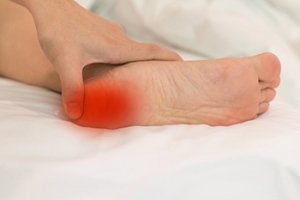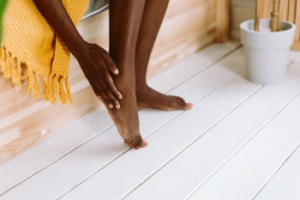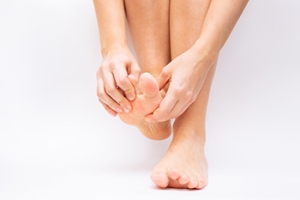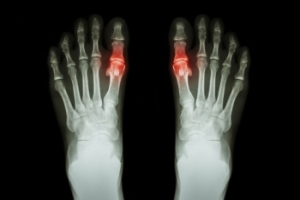Items filtered by date: August 2024
Definition and Causes of Sever’s Disease
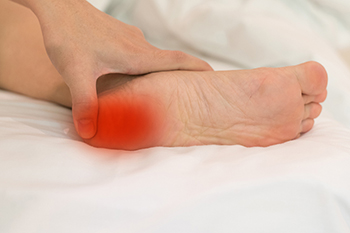
Sever’s disease, also known as calcaneal apophysitis, is a common condition affecting children and adolescents, particularly those who are active in sports. It occurs when the growth plate in the heel becomes inflamed due to excessive stress and strain. The primary symptoms include heel pain, tenderness, and swelling, which often intensify with physical activity and may improve with rest. This condition typically affects children during periods of rapid growth, especially those involved in running or jumping sports. The repetitive pressure and tension on the heel can worsen the inflammation. Addressing Sever’s disease involves reducing activities that strain the heel and using supportive footwear to provide proper cushioning. If your active child has heel pain, it is suggested that you confer with a podiatrist who can help your child to find relief from this uncomfortable condition.
Sever's disease often occurs in children and teens. If your child is experiencing foot or ankle pain, see Dr. Kenneth Donovan from Advanced Care Foot and Ankle. Our doctor can treat your child’s foot and ankle needs.
Sever’s Disease
Sever’s disease is also known as calcaneal apophysitis, which is a medical condition that causes heel pain I none or both feet. The disease is known to affect children between the ages of 8 and 14.
Sever’s disease occurs when part of the child’s heel known as the growth plate (calcaneal epiphysis) is attached to the Achilles tendon. This area can suffer injury when the muscles and tendons of the growing foot do not keep pace with bone growth. Therefore, the constant pain which one experiences at the back of the heel will make the child unable to put any weight on the heel. The child is then forced to walk on their toes.
Symptoms
Acute pain – Pain associated with Sever’s disease is usually felt in the heel when the child engages in physical activity such as walking, jumping and or running.
Highly active – Children who are very active are among the most susceptible in experiencing Sever’s disease, because of the stress and tension placed on their feet.
If you have any questions, please feel free to contact one of our offices located in Warren, Livingston, and Toms River, NJ . We offer the newest diagnostic and treatment technologies for all your foot and ankle injuries.
Underlying Issues That May Cause Heel Pain

A variety of underlying issues can cause heel pain, such as bone disorders, soft tissue problems, and systemic diseases. Plantar fasciitis is the most common cause of heel pain. This occurs when the plantar fascia, the long band of fibrous tissue on the sole of the feet, gets damaged, torn, or inflamed. Other soft tissue disorders that may lead to heel pain include Achilles tendonitis, which is an inflammation of the tendon that connects the calf muscles to the heel bone, and bursitis, which is an inflammation of the bursa sac that protects the Achilles tendon at the back of the heel. Bone issues that can cause heel pain include traumatic injuries or stress fractures of the heel bone, osteoporosis, and heel spurs, which are hardened calcium deposits that build up on the heel bone due to repeated stress. Certain systemic diseases that also result in heel pain include rheumatoid arthritis and peripheral neuropathy. If you have any type of heel pain, it is suggested that you make an appointment with a podiatrist who can diagnose its origin and treat your condition accordingly.
Many people suffer from bouts of heel pain. For more information, contact Dr. Kenneth Donovan of Advanced Care Foot and Ankle. Our doctor can provide the care you need to keep you pain-free and on your feet.
Causes of Heel Pain
Heel pain is often associated with plantar fasciitis. The plantar fascia is a band of tissues that extends along the bottom of the foot. A rip or tear in this ligament can cause inflammation of the tissue.
Achilles tendonitis is another cause of heel pain. Inflammation of the Achilles tendon will cause pain from fractures and muscle tearing. Lack of flexibility is also another symptom.
Heel spurs are another cause of pain. When the tissues of the plantar fascia undergo a great deal of stress, it can lead to ligament separation from the heel bone, causing heel spurs.
Why Might Heel Pain Occur?
- Wearing ill-fitting shoes
- Wearing non-supportive shoes
- Weight change
- Excessive running
Treatments
Heel pain should be treated as soon as possible for immediate results. Keeping your feet in a stress-free environment will help. If you suffer from Achilles tendonitis or plantar fasciitis, applying ice will reduce the swelling. Stretching before an exercise like running will help the muscles. Using all these tips will help make heel pain a condition of the past.
If you have any questions please contact one of our offices located in Warren, Livingston, and Toms River, NJ . We offer the newest diagnostic and treatment technologies for all your foot and ankle needs.
Causes of Numbness in the Toes
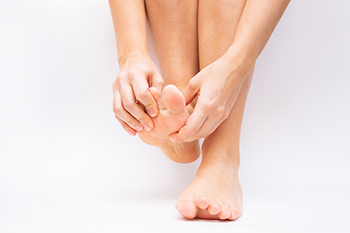
Experiencing numbness in your toes can be disconcerting, as it often points to underlying health issues. One of the most common causes of numb toes is wearing tight shoes that restrict circulation and compress nerves. Diabetes is another major factor, with high blood sugar levels leading to peripheral neuropathy that decreases sensation in the feet. The buildup of plaque in arteries can result in peripheral artery disease, which causes numbness in the toes from restricted blood flow. Hypothyroidism, where the thyroid gland produces insufficient hormones, may lead to fluid retention and nerve damage, affecting the toes. Other causes of numb toes can include bunions, Morton's neuroma, and vitamin B12 deficiency, each affecting the nerves and blood supply to the toes. A podiatrist can help identify the specific cause of numbness through a series of tests. If your toes are frequently numb, it is suggested that you schedule an appointment with a podiatrist for an exam, diagnosis, and treatment.
Neuropathy
Neuropathy can be a potentially serious condition, especially if it is left undiagnosed. If you have any concerns that you may be experiencing nerve loss in your feet, consult with Dr. Kenneth Donovan from Advanced Care Foot and Ankle. Our doctor will assess your condition and provide you with quality foot and ankle treatment for neuropathy.
What Is Neuropathy?
Neuropathy is a condition that leads to damage to the nerves in the body. Peripheral neuropathy, or neuropathy that affects your peripheral nervous system, usually occurs in the feet. Neuropathy can be triggered by a number of different causes. Such causes include diabetes, infections, cancers, disorders, and toxic substances.
Symptoms of Neuropathy Include:
- Numbness
- Sensation loss
- Prickling and tingling sensations
- Throbbing, freezing, burning pains
- Muscle weakness
Those with diabetes are at serious risk due to being unable to feel an ulcer on their feet. Diabetics usually also suffer from poor blood circulation. This can lead to the wound not healing, infections occurring, and the limb may have to be amputated.
Treatment
To treat neuropathy in the foot, podiatrists will first diagnose the cause of the neuropathy. Figuring out the underlying cause of the neuropathy will allow the podiatrist to prescribe the best treatment, whether it be caused by diabetes, toxic substance exposure, infection, etc. If the nerve has not died, then it’s possible that sensation may be able to return to the foot.
Pain medication may be issued for pain. Electrical nerve stimulation can be used to stimulate nerves. If the neuropathy is caused from pressure on the nerves, then surgery may be necessary.
If you have any questions, please feel free to contact one of our offices located in Warren, Livingston, and Toms River, NJ . We offer the newest diagnostic and treatment technologies for all your foot care needs.
Symptoms of Gout
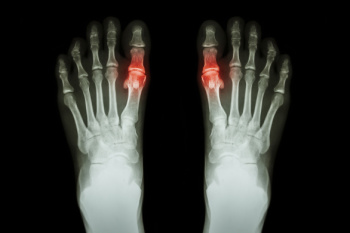
Gout is a form of arthritis resulting in severe pain that can happen suddenly, along with swelling, and tenderness in joints, and often starts with the big toe. This condition occurs when urate crystals accumulate in the joints due to high levels of uric acid in the blood. The pain typically peaks within a few hours and can be accompanied by warmth and redness around the affected joint. Gout attacks can occur suddenly, often waking individuals from sleep with intense discomfort. Recurrent gout episodes can lead to joint damage and deformities, if left untreated. Besides the big toe, gout can affect other joints such as ankles, knees, elbows, wrists, and fingers. Managing gout involves lifestyle changes like reducing purine-rich foods and alcohol consumption, along with medications to lower uric acid levels and prevent future attacks. If you have excruciating pain in your big toe, it is strongly suggested that you consult a podiatrist who can provide an accurate diagnosis and treatment.
Gout is a foot condition that requires certain treatment and care. If you are seeking treatment, contact Dr. Kenneth Donovan from Advanced Care Foot and Ankle. Our doctor will treat your foot and ankle needs.
What Is Gout?
Gout is a type of arthritis caused by a buildup of uric acid in the bloodstream. It often develops in the foot, especially the big toe area, although it can manifest in other parts of the body as well. Gout can make walking and standing very painful and is especially common in diabetics and the obese.
People typically get gout because of a poor diet. Genetic predisposition is also a factor. The children of parents who have had gout frequently have a chance of developing it themselves.
Gout can easily be identified by redness and inflammation of the big toe and the surrounding areas of the foot. Other symptoms include extreme fatigue, joint pain, and running high fevers. Sometimes corticosteroid drugs can be prescribed to treat gout, but the best way to combat this disease is to get more exercise and eat a better diet.
If you have any questions please feel free to contact one of our offices located in Warren, Livingston, and Toms River, NJ . We offer the newest diagnostic and treatment technologies for all your foot and ankle needs.
